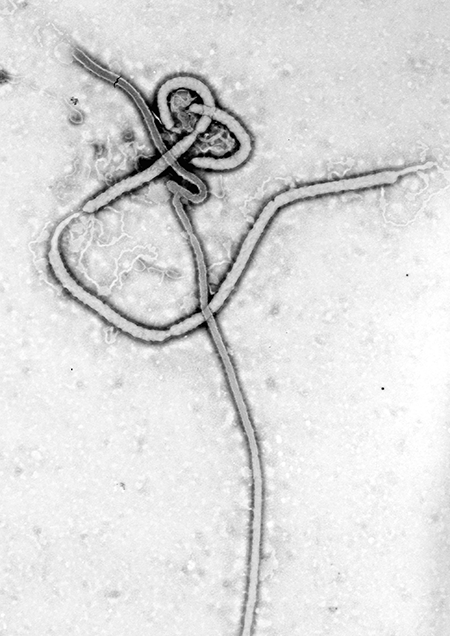
An Ebola viral particle. Photo credit: U.S. Centers for Disease Control/Frederick A. Murphy, via Wikimedia Commons
Srinivas Murthy, a Clinical Assistant Professor in the Department of Pediatrics, recently returned from a five-week stint coordinating clinical care for Ebola patients in Liberia.
Dr. Murthy, 33, a critical care specialist at BC Children’s Hospital, served as the World Health Organization’s national lead for case management — overseeing health worker training, mentoring local staff, developing clinical guidelines, and formulating policies and checklists for field hospitals.
Although Dr. Murthy had done medical service in Asia and sub-Saharan Africa, treating patients with other infectious diseases, he said he had never before experienced a health crisis that was so urgent and so widespread, requiring such a rapid and massive mobilization.
He spent most of his time in Monrovia, the country’s capital. During his visits to treatment facilities, he saw dramatic differences in the quality of care from one place to the next.
“Some places were doing good things with minimal resources,” he says. “Other places were not doing as efficient a job.”
He left Liberia feeling that the crisis is now receiving enough money, and maybe even enough health workers. What it most needs now are all kinds of other experts who can keep a complex health system running.
“It’s more of an issue getting things where they need to be,” he says. “There are logistical issues that a financial bolus by itself doesn’t solve. While I was there, there were doctors waiting around for something to do because there wasn’t enough protective gear for them, or there wasn’t any water or sanitation for them to work in a field hospital. And unfortunately there’s no easy fix to that. You just can’t parachute in people like me and expect that things are going to get better.”
Dr. Murthy was profiled in a Nov. 10 Toronto Star article that focused on four Canadian health workers who have worked in west Africa fighting Ebola.
“I have a full-time job, I have two small kids, and I have a wife that works,” he told the Star. “Trying to find a good time to leave for five weeks — and convincing my bosses and wife and kids that that was OK — took some effort.”
As the article explains, Dr. Murthy didn’t tell his extended family he was going; his parents discovered he was in Liberia after a relative heard him being interviewed on a U.S. radio program. “They were mad, I think, when they found out,” Murthy told the Star. “But by the time they actually got a hold of me, they were fine.”
Read the entire article here.
Dr. Murthy will be speaking at a symposium on Ebola treatment and action, Nov. 13 on the UBC campus. Tickets are still available.